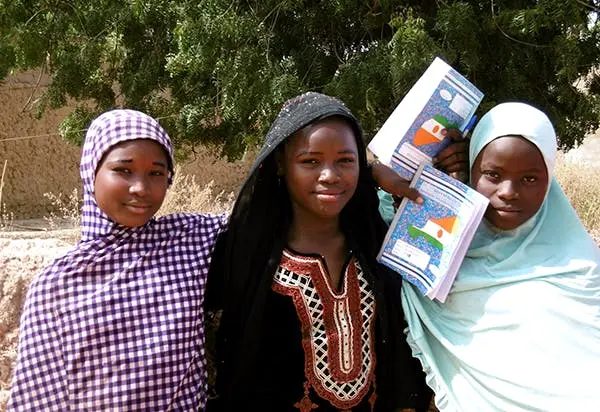Girls education in Niger
The objective of the Sarraouania programme is to prevent young girls in the age between 12 and 16 to drop out school early, primarily in the rural areas of Niger. SenseGuide was given the task to perform a baseline assessment with the SenseMaker approach.
Young girls in Niger rather receive low quality education then marry early
Numbers do not lie: Education helps to protect young girls. Education helps in the fight against child marriages and against infant mortality. Because of their education women can better contribute to making their community a fair and more inclusive place. Girls with a degree grow up to become women investing 90% of their incomes in their family; Household incomes may increase with 25% for each year of additional schooling and mothers with a degree are twice as likely to send their children to school.
In Niger, only 64% of girls are registered for school. Women’s literacy rates are also very low. Indeed, women literacy rate is at 18.2% only, against 40.2% for men (2012).
Despite the efforts of the government of Niger and the support of numerous international partners today there remain still many challenges to ensure universal and inclusive education by 2025. One of the strategic objectives of the new sector-oriented policy is to make sure that young girls do not drop out of school early, primarily in rural areas where schools consist mainly of young girls.
Project Sarraounia
Project Sarraounia is the outcome of bilateral cooperation between Niger and Belgium. The Belgian Technical Cooperation (now called Enabel) in collaboration with the Department of Secondary Education, Research and Technology are the implementation partners. The project, which will operate in six municipalities in the Dosso region, aims to ensure that young girls do not drop out of school early.
Giving young girls a voice
By asking young girls to do the primary analysis of their own micro-narratives, their involvement in the action-research process as a key player is an added value for the objectivity of the monitoring-evaluation process, because the risk of a false interpretation is thus considerably reduced. The use of SenseMaker® gives the opportunity to strengthen the voice of young girls by sharing with them real experiences to better understand not only the major challenges they face in the follow-up of their studies, but also their sources of motivation to successfully complete their studies.
Key insights
The analysis of the results shows a homogeneous culture with little difference between the realities experienced by the girls surveyed. Indeed, no difference between colleges, classes and ages has been detected. All girls in school highly value their own studies.
The results again emphasize the importance of activities aimed at improving the attractiveness of the school environment. Perennial solutions should be sought to the problem of travel distance, a problem that has been raised by a majority of girls. When it comes to bullying / violence among students, it is important to understand what type of violence / bullying it is and in what context, it intervenes precisely to make sure that this is not a problem.
It is clear that barriers to girls' home life such as early marriage and household chores have a great influence on their academic survival. The results obtained confirm the complexity of schooling in rural communities, the important thing is not so much the prioritization between the different obstacles, but the valorization of the strength of these girls, who persevere and resist the school dropout despite all the obstacles that threaten them in their journey.
In sum, their great motivation is a likely sign of the hope that these girls show for their studies. It is ultimately also a sign of their faith in an education, whose quality is so low, it is far better than early marriage.

